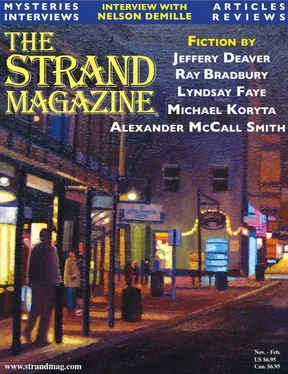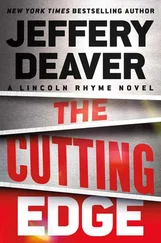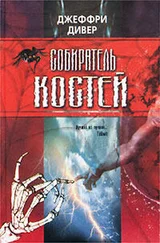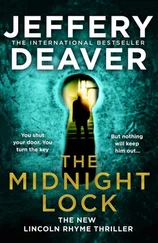Jeffery Deaver
The Sequel
The very first letter Frederick Lowell slit open and read at his desk Monday morning would, he realized, change the course of history.
Literary history at least.
Which was, to him, perhaps the most important history of all.
Sporting a gray, three-piece suit, white shirt, and striped tie, Lowell sat in his anachronistic office on Seventh Avenue, a dim room tinged with a patina of old New York — high ceilings, windows that rose and lowered, stained oak trim, walls distorted by many layers of paint. The surfaces of the furniture and shelves were continually coated with the grit that always found its way inside as persistently as auditors at a hedge fund. And the music of street traffic, shouts, and jackhammers filled the air. The seventy-two-year-old lawyer pushed his metal bifocals higher on his nose, took a deep breath, and read the letter again.
Dear Mr. Lowell:
It has come to my attention that you are the literary trustee of the estate of the late author Edward Goodwin. I am an attorney in Ridgefield, CT. Recently I settled the estate of a client, who passed away three months ago.
The family of this client does not wish his or her name to be disclosed. However, they have instructed me that I may inform you of a discovery that was made during a review of my client’s correspondence.
Apparently my client was a friend of the late Mr. Goodwin during the 1960s. A carbon copy of a letter written to Mr. Goodwin was discovered among my client’s effects. It refers to a sequel to Cedar Hills Road. I myself am no expert on cultural history but even I am aware of the controversy as to whether or not Mr. Goodwin was working on a sequel to the novel when he passed away. The letter from my late client, a portion of which is reproduced here, suggests that indeed he was:
March 4, 1967
My dearest Edward,
[Material Deleted]
Finally, Edward, I’m delighted to learn from your latest letter that you are moving along well on the sequel to Cedar Hills Road. Is it true you are nearly finished? And let me say that I feel Anderson’s Hope is the perfect title. I know how tormented you were with the writer’s block you described in writing Cedar Hills and the even more difficult struggles you’ve had penning the sequel. It seems that you were right — it took getting away from the madness of urban life to the idyllic countryside and the beloved house of God that is so important to you. I cannot wait to read the second volume of the saga that, to me, defines America.
Mr. Lowell, I have examined all the other correspondence of my client and find no other references whatsoever to this sequel, nor were there notes or drafts of any fiction in my client’s possession related to this matter. The heirs of my client are willing to offer only the paragraph above, although they wish you the best in pursuing the matter if you so choose.
Very truly yours,
Daniel C. Wellington, Esq.
Frederick Lowell was a slim widower with a balding pate and affection for light opera and heavy novels. His life was simple: the law, walks around the city, meals with a close friend or with a book at one of the half-dozen modest restaurants he frequented on the Upper East Side, the enduring pleasure in taking his grandchildren to the zoo and movies (and bribing them with ice cream and s’mores to let Granddad read them the classics). He was staid and the epitome of calm ratiocination. Yet at the moment his heart was pounding, his palms popping with sweat, and he thought he might leap to his feet and dance a jig.
In 1966, a little-known journalist named Edward Goodwin published a novel called Cedar Hills Road, which immediately rose to the top of the best-seller lists.
Cedar Hills was one of those novels that come along once in a generation and take the literary world by storm. Writers can never be great unless they address the topic of death, and American writers can never be great unless they address the topic of race. Cedar Hills did both. Goodwin’s keen and poignant portrayals of family, justice, and morality captured the imagination of readers everywhere. The novel was a success because Goodwin painted these large subjects on a small canvas: a year in the lives of a Midwest American family, the Andersons, in their move from Hamilton, Ohio, to Chicago.
The book became a publishing phenomenon. It was sold in every major country on earth. The film version was described by a cantankerous but perceptive New Yorker critic as one of the most successful adaptations of a book to silver screen in the history of cinema.
The novel was largely self-contained, all the subplots tied up in craftsman style by the last page. And yet... the public hungered for more. This was hardly a surprise; who didn’t want seconds of their favorite meal? Of particular interest was the fate of the youngest son, Jesse Anderson, the most appealing of the family — the most observant, the most thoughtful.
But a sequel did not materialize. There were rumors that Goodwin was working on it, but stories also circulated that the success of the first book had sucked his creative well dry, like alum, and that he’d grown reclusive and taken to drinking heavily. The author died, at home in Chicago, in June of 1967 of pancreatic cancer, having never published another word after Cedar Hills.
If anyone might have known of a sequel, it would have been Frederick Lowell. His father, Richard, had been Goodwin’s attorney and after the author’s passing, the trustee of his literary estate. As Richard approached retirement age, in the 1980s, he shyly asked if his son would have an interest in joining him. The NYU law grad had leapt at the chance to give up the drudgery of hostile takeovers and international finance work on Wall Street, where he worked, and move uptown to become the right-hand portion of Lowell & Lowell.
After his father’s retirement, Frederick became successor trustee and took up the job as shepherd of Cedar Hills Road on behalf of Goodwin’s heirs — his son and daughter. Most of this work involved negotiating renewals and new contracts for the book’s publication and pursuing infringement claims. Often too he would field questions from publishers — and fans — as to whether a sequel existed. He’d pursued the matter years ago and found no evidence of one.
But now? Could it be true?
Outside the window, the jackhammers echoed the fierce thudding of his heart.
But a reference to a manuscript does not a manuscript make.
“Caitlin?” Lowell called into the ante-office.
“Yes?” asked the young woman, a brunette who would be delicate looking if not for the ink and piercings. Like Lowell, she was an NYU law school grad, cum laude , but one who preferred a more blended life than practicing law offered: as a paralegal during the day and East Village songstress at night.
“Hold all calls and cancel meetings for the next two days.”
“Is everything all right?”
“Oh, yes, very much all right,” the lawyer said enthusiastically and with more volume and animation than normal — earning him an amused but suspicious gaze from his assistant. Frederick Lowell was not known for outpourings of emotion. In fact, he was not known for much emotion at all.
One aspect of the job as trustee of the Goodwin estate that Lowell did not enjoy was, curiously, a main contractual duty: collecting and distributing to the heirs the royalties and other payments that Cedar Hills generated.
He’d come to believe that if anything had derailed the lives of Goodwin’s children it was the late author’s generosity.
Читать дальше









![Джеффри Дивер - Where the Evidence Lies [A Lincoln Rhyme Short Story]](/books/403782/dzheffri-diver-where-the-evidence-lies-a-lincoln-r-thumb.webp)


